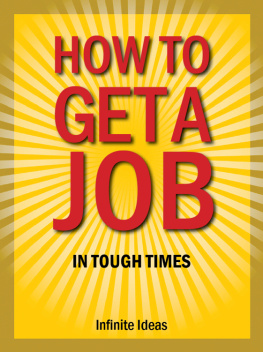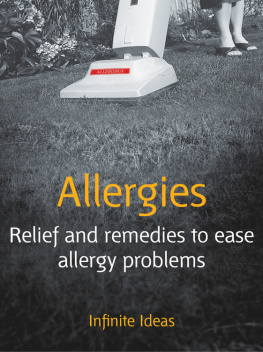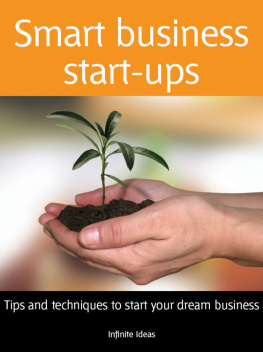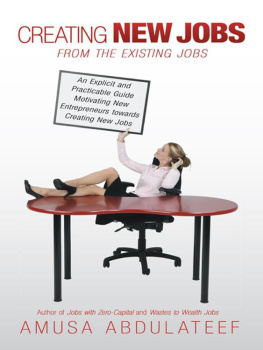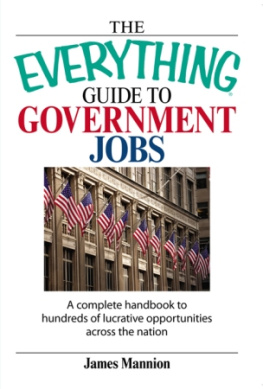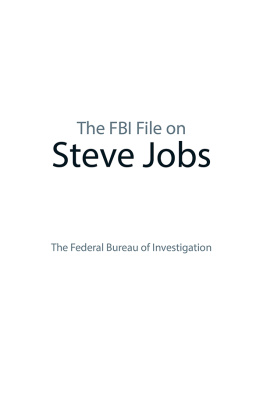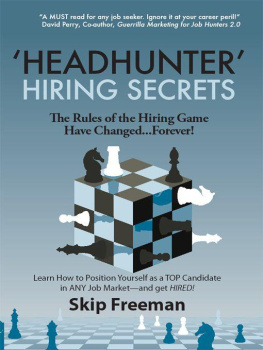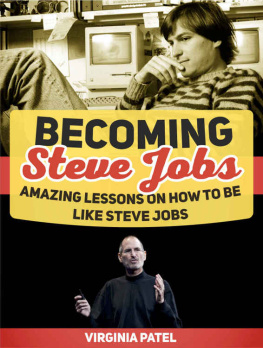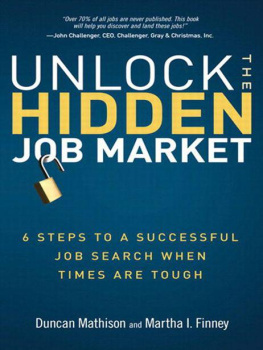How to get a job in tough times
Infinite Ideas with Harry Freedman

Skill competency rating scale:
1 = Undeveloped 2 = Adequate 3 = Competent 4 = Very competent
Skill type | Skill competency (rate 14) | Skills I enjoy using (tick) | Skills Id like to develop (tick) | Skills used in achievements (tick) |
People skills |
Interviewing others for information |
Facilitating group discussions, meetings |
Building teams |
Representing others |
Advising others |
Leading others |
Mediating, resolving conflict |
Managing, supervising others |
Coaching, motivating others |
Actively listening, assessing needs |
Caring for others |
Empathising, conveying warmth to others |
Serving others |
Training, teaching others |
Presenting, performing in front of a group |
Speaking in a foreign language |
Entertaining, amusing others |
Meeting new people |
Putting others at ease |
Building and maintaining relationships |
Influencing, persuading others |
Negotiating with others |
Selling goods or ideas to others |
Skill type | Skill competency (rate 14) | Skills I enjoy using (tick) | Skills Id like to develop (tick) | Skills used in achievements (tick) |
Information skills |
Researching, gathering information |
Investigating, finding out the facts |
Observing, examining people, trendwatching |
Analysing information, data |
Classifying and recording information |
Interpreting and explaining |
Reviewing and evaluating |
Writing clearly and concisely |
Editing, summarising information |
Planning tasks, projects |
Managing knowledge, information |
Administering tasks |
Organising resources, information |
Managing projects, events |
Paying attention to detail |
Problem solving, troubleshooting |
Improving systems and procedures |
Assessing risks, probabilities |
Making decisions under pressure |
Operating computers, using IT |
Working with numbers, statistics |
Budgeting, costing, managing money |
Forecasting, predicting |
Seeing ways to save time or money |
Skill type | Skill competency (rate 14) | Skills I enjoy using (tick) | Skills Id like to develop (tick) | Skills used in achievements (tick) |
Idea skills |
Innovating, creating new solutions |
Imagining new ideas, concepts, alternatives |
Thinking laterally |
Developing the ideas of others |
Creating new systems and procedures |
Designing a plan for a project or object |
Designing using shapes, spaces, colours |
Designing machines, technology |
Writing creatively |
Drawing, painting |
Composing music |
Using intuition, insight |
Initiating, starting up new projects |
Improvising under pressure |
Assessing situations and people quickly and accurately |
Thinking strategically, seeing the bigger picture |
Observing, interpreting patterns and trends |
Practical/physical skills |
Constructing, building, assembling |
Installing, fitting, adapting |
Making, crafting things, materials |
Fixing, repairing machines, equipment |
Operating, controlling, maintaining |
Handling tools |
Driving vehicles |
Manual dexterity |
Hand-eye coordination |
Playing a musical instrument |
Physical fitness, strength |
Other skills |
Highlight in some way on your table those skills in which have rated yourself as Competent or Very competent in the first column and that you have indicated in the second column that you enjoy using. Note which skill types these generally fall into. You might want to discuss the results with a friend who knows you well.
If your list is very long, create a shorter list of the top 10 skills that you enjoy using the most and for which you have given yourself a competency rating of 3 or 4 and note also which skill group (people, information, practical or ideas) each falls into.
Skills exercise 3: linking your skills and achievements
Now go back to the achievements exercise and review each one in turn. Note down the key skills you used for each achievement, up to a maximum of 5 each. For example, if your achievement was to resolve a long running dispute between two colleagues, you may have used persuading, empathising and problem solving skills.
Now add up the number of times each skill occurs. List the ten skills that occur most frequently.
By linking your skills and achievements in this way you can give examples to potential employers of the skills you possess. Employers want to know your key skills and need you to provide them with actual evidence that you have those skills. That is, specific examples when you have successfully used your skills to produce a beneficial outcome for yourself, for others or your organisation.
Finally, go back to the answers you wrote in the achievements section of the initial assessment. Look at the skills that you said you have used. Bearing in mind what we said above about carpentry, can you break any of these skills down into smaller units? Look again at the actual achievement. Are there other, more specialised skills that you can include now that you see how large skills can be made up of smaller ones? Write all these skills in a column on the left hand side of a separate sheet of paper. Head the column My top skills.
Now lets consider your everyday skills. You may not have used these skills when you were carrying out one of your achievements, but they are just as important. There are many ways to identify your everyday skills. The easiest way is to make a list of all the tasks you regularly perform you may find it easier to keep a diary for a few days. Consider which skills you are using when performing these tasks. Write them down in the same column as your top skills, under the heading Everyday skills.
Finally we need to consider your undeveloped skills. These are not so easy to spot. They may be skills that you used as a child, or even skills you have never used, but just suspect that you have. Think back to episodes from your childhood, or memorable events as an adult. Can you see yourself acting in a particularly capable or talented way in any of these episodes? If so, what skill might you have been using? Write it down in the same column, under the heading Undeveloped skills.

